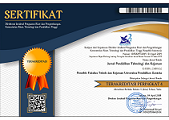REMASTERING SISTEM OPERASI BERBASIS OPEN SOURCE LINUX UNTUK PEMBELAJARAN KIMIA (STUDI KASUS PADA MATA KULIAH KOMPUTASI DATA JURUSAN ANALIS KIMIA UNDIKSHA)
DOI:
https://doi.org/10.23887/jptk-undiksha.v12i1.4903Abstract
Penelitian ini bertujuan untuk merancang pengembangan remastering sistem operasi berbasis open source linux untuk pembelajaran kimia pada mata kuliah Komputasi Data dan mengetahui respon mahasiswa terhadap remastering sistem operasi tersebut. Rancangan yang digunakan dalam penelitian ini adalah rancangan penelitian pengembangan (Research and Development). Pengumpulan data respon mahasiswa dilakukan dengan cara pemberian angket kepada mahasiswa. Data yang terkumpul dianalisis secara statistik deskriptif.
Rancangan remastering dilakukan berdasarkan analisis kebutuhan pada mata kuliah Komputasi Data. Remastering dirancang menggunakan Linux Ubuntu 10.4 dan menggabungkan program aplikasi kimia yaitu Avogadro, Bkchen, Chemical calculator, dwawXTL, GabEdit, GchemPaint, Gperiodic, Kalzium, PeriodicTable, XdrawChem. Respon mahasiswa terhadap pengembangan remastering sistem operasi linux untuk pembelajaran kimia pada mata kuliah Komputasi Data adalah sangat positifDownloads
Published
2015-01-31
Issue
Section
JPTK
License
Authors who publish with the JPTK agree to the following terms:- Authors retain copyright and grant the journal the right of first publication with the work simultaneously licensed under a Creative Commons Attribution License (CC BY-SA 4.0) that allows others to share the work with an acknowledgment of the work's authorship and initial publication in this journal
- Authors are able to enter into separate, additional contractual arrangements for the non-exclusive distribution of the journal's published version of the work (e.g., post it to an institutional repository or publish it in a book), with an acknowledgment of its initial publication in this journal.
- Authors are permitted and encouraged to post their work online (e.g., in institutional repositories or on their website) prior to and during the submission process, as it can lead to productive exchanges, as well as earlier and greater citation of published work. (See The Effect of Open Access)












